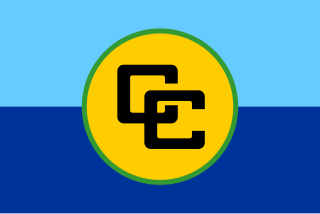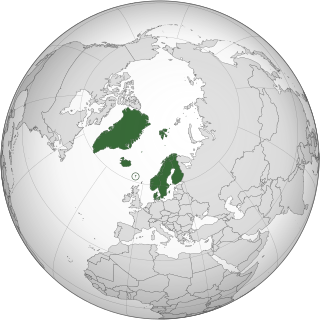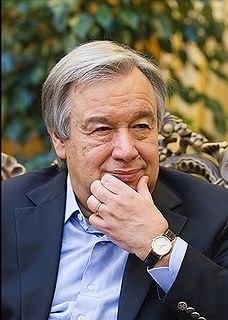
The Council of Europe is an international organisation founded in the wake of World War II to uphold human rights, democracy and the rule of law in Europe. Founded in 1949, it has 47 member states, with a population of approximately 820 million, and operates with an annual budget of approximately 500 million euros.

The European Union (EU) is a political and economic union of 27 member states that are located primarily in Europe. The union has a total area of 4,233,255.3 km2 (1,634,469.0 sq mi) and an estimated total population of about 447 million. An internal single market has been established through a standardised system of laws that apply in all member states in those matters, and only those matters, where the states have agreed to act as one. EU policies aim to ensure the free movement of people, goods, services and capital within the internal market; enact legislation in justice and home affairs; and maintain common policies on trade, agriculture, fisheries and regional development. Passport controls have been abolished for travel within the Schengen Area. A monetary union was established in 1999, coming into full force in 2002, and is composed of 19 member states which use the euro currency. The EU has often been described as a sui generis political entity with the characteristics of either a federation or confederation.
The Cree are a North American indigenous people. They live primarily in Canada, where they form one of that country's largest First Nations.

The Caribbean Community is an organisation of fifteen states and dependencies throughout the Caribbean having primary objectives to promote economic integration and cooperation among its members, to ensure that the benefits of integration are equitably shared, and to coordinate foreign policy. The organisation was established in 1973. Its major activities involve coordinating economic policies and development planning; devising and instituting special projects for the less-developed countries within its jurisdiction; operating as a regional single market for many of its members ; and handling regional trade disputes. The secretariat headquarters is in Georgetown, Guyana. CARICOM is an official United Nations Observer.
The International Phonetic Association is an organization that promotes the scientific study of phonetics and the various practical applications of that science. The IPA's major contribution to phonetics is the International Phonetic Alphabet—a notational standard for the phonetic representation of all languages. The acronym IPA refers to both the association and the alphabet. On 30 June 2015, it was incorporated as a British private company limited by guarantee.

The Aristotle University of Thessaloniki is the sixth oldest, and among the most highly ranked tertiary education institution, within Greece.
The Common European Framework of Reference for Languages: Learning, Teaching, Assessment, abbreviated in English as CEFR or CEF or CEFRL, is a guideline used to describe achievements of learners of foreign languages across Europe and, increasingly, in other countries. The CEFR is also intended to make it easier for educational institutions and employers to evaluate the language qualifications of candidates to education admission or employment. It was put together by the Council of Europe as the main part of the project "Language Learning for European Citizenship" between 1989 and 1996. Its main aim is to provide a method of learning, teaching and assessing which applies to all languages in Europe. In November 2001, a European Union Council Resolution recommended using the CEFR to set up systems of validation of language ability. The six reference levels are becoming widely accepted as the European standard for grading an individual's language proficiency.

European Union culture policies aim to address and promote the cultural dimension of European integration through relevant legislation and government funding. These policies support the development of cultural activity, education or research conducted by private companies, NGO's and individual initiatives based in the EU working in the fields of cinema and audiovisual, publishing, music and crafts.

The United Nations International School of Hanoi is an international school in Hanoi, Vietnam. It is a private, non-profit organization founded in 1988 with the support of the United Nations Development Programme in Vietnam (UNDP) with the aim of providing an education to the children of UN staff and others.

Andrei Dapkiunas is a Belarusian diplomat who is currently Ambassador-designate of Belarus to Austria and Slovenia, Permanent Representative of Belarus to the international organisations in Vienna and to the Organisation for Security and Co-operation in Europe (OSCE). He holds the rank of Ambassador Extraordinary and Plenipotentiary since 2011.

The European Union (EU) consists of 27 member states which are signatories to the founding treaties of the union and thereby shares in the privileges and obligations of membership. They have agreed by the treaties to share their own sovereignty through the institutions of the European Union in some aspects of government. State governments must agree unanimously in the Council for the union to adopt some policies; for others, collective decisions are made by qualified majority voting. These obligations and sharing of sovereignty within the EU make it unique among international organisations, as it has established its own legal order which by the provisions of the founding treaties is both legally binding and supreme on all the member states. A founding principle of the union is the principle of subsidiarity, meaning that decisions are taken collectively if and only if they cannot realistically be taken individually.
The Linguistic Bibliography / Bibliographie Linguistique is an annual publication which first appeared in 1949. The publication provides comprehensive bibliographical descriptions of publications in theoretical linguistics, with about 20,000 items added per year. Since 2002, the database has also been available online, as Linguistic Bibliography Online, and contains data from 1993 onward.
Pearson Language Tests is a unit of the Pearson PLC group, dedicated to assessing and validating the English language usage of non-native English speakers. The tests include the Pearson Test of English (PTE) Academic, PTE General and PTE Young Learners. These are scenario-based exams, accredited by the QCA, Ofqual, and administered in association with Edexcel, the world's largest examining body.

The accession of North Macedonia to the European Union (EU) has been on the current agenda for future enlargement of the EU since 2005, when it became a candidate for accession. Macedonia submitted its membership application in 2004, thirteen years after its independence from Yugoslavia. It is one of five current EU candidate countries, together with Albania, Montenegro, Serbia and Turkey. The use of the country name "Macedonia" was the object of a dispute with neighboring Greece between 1991 and 2019, resulting in a Greek veto against EU and NATO accession talks, which lasted from 2008 to 2019. After the issue was resolved, the EU gave its formal approval to begin accession talks with North Macedonia and Albania in March 2020. However, in November 2020 Bulgaria effectively blocked the official start of North Macedonia's EU Accession Negotiations over what it perceives as slow progress on the implementation of the 2017 Friendship Treaty between the two countries, state-supported or tolerated hate speech and minority claims towards Bulgaria.

The Kingdom of the Netherlands, commonly known as the Netherlands, is a sovereign state and constitutional monarchy with 98% of its territory and population in Western Europe and with several small West Indian island territories in the Caribbean.

The Nordic countries, or the Nordics, or Norden, are a geographical and cultural region in Northern Europe and the North Atlantic, which includes the sovereign states of Denmark, Norway and Sweden, Finland, and Iceland, as well as the autonomous countries of the Faroe Islands and Greenland.

Relations between the Principality of Liechtensteinand the European Union (EU) are shaped heavily by Liechtenstein's participation in the European Economic Area (EEA).

A United Nations Secretary-General selection was held in October 2016 to choose the ninth Secretary-General of the United Nations to succeed Ban Ki-moon from 1 January 2017. Six straw polls were held in the Security Council from 21 July 2016 to 5 October 2016. António Guterres of Portugal led the polling in every round, finishing the last round with 13 'encourage' votes, 0 'discourage' votes, and 2 abstentions. On 6 October 2016, the Security Council unanimously recommended Guterres to the General Assembly, which formally selected him by acclamation on 13 October 2016.
The International Speech Communication Association (ISCA) is a non-profit organization and one of the two main professional associations for speech communication science and technology, the other association being the IEEE Signal Processing Society.











